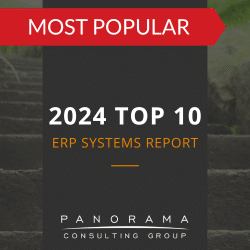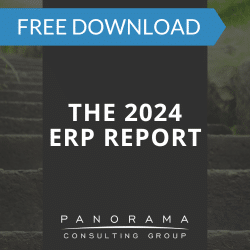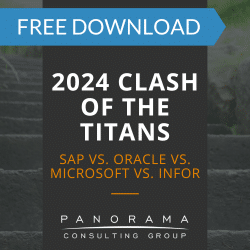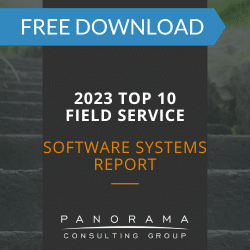Are you considering implementing a new ERP system, CRM system, or SCM system? If so, you’re probably wondering how much it’s going to cost. Well, we’ve got some good news and bad news. The good news is that this is the topic of today’s post. The bad news is that we’re not going to sugarcoat it – there are more ERP costs than you might think.
Sit back as we guide you through the process of estimating ERP total cost of ownership (TCO), including both direct and indirect costs.
Estimating Direct ERP Costs
Software Costs
This includes annual maintenance and support fees, as well as license fees, which vary depending on the size and complexity of your organization.
Additionally, you will need to factor in the cost of customization and any additional software modules or add-ons you may need to support your business processes.
To minimize software costs, you should carefully evaluate ERP vendors (SAP vs Oracle vs Microsoft Dynamics vs Infor vs a Tier II solution), and weigh your deployment options (hosted vs SaaS, etc.). Then, work with an ERP selection consultant to negotiate the best deal.
Software Selection & Process Improvement Case Study
In helping the client get its project back on track, one of our primary focus areas was decreasing their customization needs by improving their processes to align with the system's best practices.
Implementation Costs
ERP implementation costs include expenses associated with planning, project management, and deployment, as well as any hardware or infrastructure upgrades.
Start by identifying the scope of the implementation. What modules and features will you need? Are you considering AI in your ERP system? What business processes will the new software impact?
Then, determine what internal resources and third parties you will need, while estimating the project timeline and the hourly rate of these resources.
Hardware and infrastructure costs are associated with servers, storage devices, network equipment, and other technical components. It’s important to consider alternative solutions, such as cloud-based hosting or virtualization.
To trim your budget, you should carefully plan and closely manage the implementation to minimize the risk of ERP failure and ensure the project stays on time and on budget.
Estimating Indirect Costs
Support and Maintenance Costs
These are ongoing expenses associated with keeping the ERP system running smoothly. Whether it’s technical support, bug fixes, or software updates, you’ll inevitably be calling on your vendor to assist you.
While your spend will vary widely depending on the vendor and the complexity of the system, you can get an estimate by requesting quotes from vendors and factoring in costs associated with third-party support and internal IT resources.
To minimize support and maintenance costs, it’s important to invest in ongoing system monitoring and optimization to ensure your system is meeting your changing business needs.
Organizational Change Management Costs
One often overlooked item is organizational change management (OCM). In this context, OCM focuses on preparing employees for the changes that will occur as a result of the new system.
The OCM costs you might incur are expenses related to ongoing end-user training and communication, as well as resistance management (a most necessary measure as people generally cling to the familiar no matter how dysfunctional it might be).
To estimate organizational change management costs, you should start by understanding the scope of the change. You can do this by identifying the areas of your organization that will be impacted by the new system and understanding individual role and responsibility changes. Then, consider the resources you will use to staff your change management team and support them. This might include both internal staff and external consultants.
To minimize the cost of project delays due to poor change management, it’s important to start planning OCM activities early and involve employees in the ERP selection process. Engaged employees are less likely to resist change, especially if they’ve had a say in the specific changes taking place.
Data Conversion Costs
Data conversion is the process of moving data from your existing systems into the new ERP system. This process includes activities such as data analysis and mapping, data cleansing, and data migration.
Data conversion can be complex and may require the assistance of external consultants, so consulting fees are another consideration.
To minimize these costs, you must develop a comprehensive data conversion plan as early as possible.
Integration Costs
Integration with other systems can be expensive, especially if your organization has a complex IT infrastructure. You may want to integrate your ERP system with existing software systems, hardware systems, or other third-party applications. As a result, you might need to develop custom interfaces and data integration solutions.
To minimize integration costs, it’s important to select a vendor or system integrator that has experience integrating with your particular systems.
Estimating ERP Total Cost of Ownership
If you want to go down in history as someone who carefully managed the ERP implementation budget, you must consider all the factors mentioned above – not just in the immediate term but over the expected life of the system.
Once you’ve estimated your ERP total cost of ownership, your next task is estimating the tangible and intangible business benefits you expect to realize. Only then can you calculate the figure that executives really care about: return on investment.
If you’re ready to develop a business case that convinces decision makers to invest in new ERP software, contact our ERP implementation consultants below.














